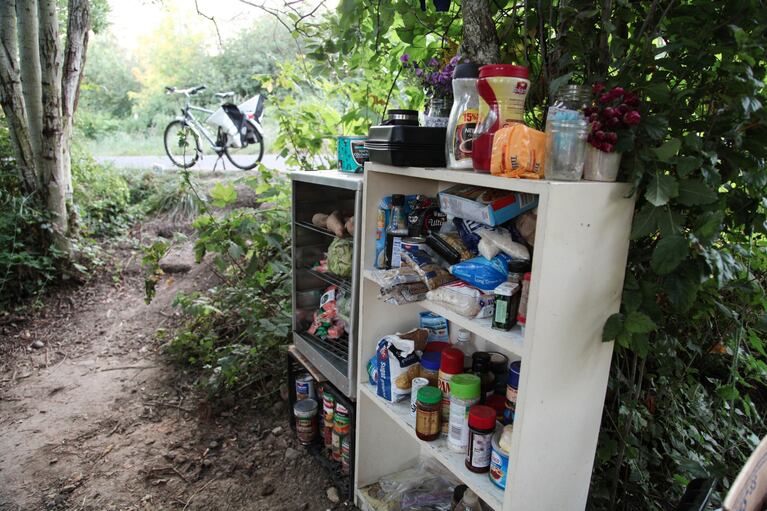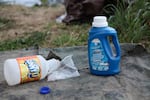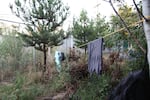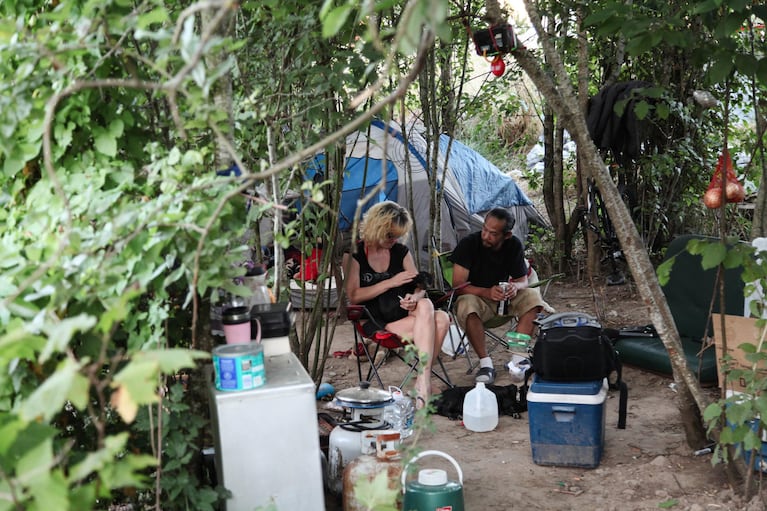
Zach and Carrie live with their dog along the Springwater Corridor Trail. The couple and their friends know that in less than two weeks they can no longer call this place home.
Amelia Templeton / OPB
This is the second of two stories exploring the homeless camps along the Springwater Corridor Trail, which the city of Portland plans to clear in August.
OPB reporter Amelia Templeton lives just a few blocks from the homeless camps that now clutter the bike and pedestrian path from inner Southeast Portland to Boring. The first part, found here, visits a neighbor to one of the camps.
Springwater Corridor Trail Homeless Camps
Portland Mayor Charlie Hales says the city will move hundreds of homeless campers off the Springwater Corridor Trail.
I got my dog Luna two years ago, when my mom was in the hospital with cancer.
She’s tiny and curious, with ears that are too big for her body. We walk on the Springwater Corridor Trail between 82nd and 92nd avenues several times a week.
Jim is the first person we meet on this particular day. He’s walking in the grass on the side of the trail, looking behind the bushes.
“I just know she’s supposed to be along here somewhere," he says. "And this is a long trail.”
Jim is searching for his ex-wife, Michelle. She’s 5 feet 5 inches tall and 135 pounds, with long brown hair. Jim says she’s been homeless for two years. She’s got mental health problems and a drug addiction.
“The crystal, just like everybody else. At least, that’s what I call it," he says. "They call it meth, or dope, or whatever.”
Jim says the trail is a bad mix: people with mental health problems and addictions and predators who prey on weaker members of the community. His ex has been raped, more than once. He says she’s probably hiding.
As we talk, his eyes keep darting up and down the trail, searching. He once got Michelle to the front door of a mental health clinic, but she refused to go inside. He starts to tell me how she became addicted. It happened after the state took away their three kids.
“When the last one was ripped out of her arms, she said, 'If they take her ...,'" he breaks off, crying, then collects himself. “It’s hard on me too, but I don’t do drugs. Better stop talking about it. I can’t take it, I’m sorry.”
I say goodbye and keep going. The next person Luna and I meet is a woman walking a Jack Russell terrier named Newton. Newton and his human walk the trail a couple times a week. They don't mind sharing it with homeless people.
“I smile and try to make eye contact and say 'hi,'" the woman says. "Sure. I don’t judge anybody. For the most part, they smile right back, and say 'hi.' They’re happy that I even acknowledged them.”

The couple gets their food from bartering, dumpster diving, donations or stealing. Carrie says common meals for them are noodles and hotdogs.
Amelia Templeton / OPB
Luna and I cross 92nd. A group is camping just a few feet off the trail. They’re using a bookshelf as a pantry. And they’ve rigged a solar shower, with four blue tarps hung up for privacy.
They invite me in, give me a camp chair and coo over my dog.
“We’re cool like that," one says.
Though they're living outdoors, their morning starts like most people’s.
"We make coffee," a woman says. "Well, he makes coffee."
That "he" is Zach. He also does the laundry by filling a cooler with warm water and soap. He says he could really use an old-fashioned washboard.
"My grandmother did laundry like that for our whole family. And she had 14 kids," he says.
Zach is looking for work. But he has a record, a long one. Three felonies. And he's a former gang member. All that scares off many potential employers.
“They see forgery. I’m out the door," he says.

With three felonies on his record, Zach struggles to find employment. Zach is hoping a repair shop a few blocks from the campsite will consider hiring him to paint cars.
Amelia Templeton / OPB
The repair shop a few blocks away said they might hire him to paint cars. It's a dream job. But to get it he needs a Social Security card, and he needs to stop drinking.
Zach and Carrie are a couple. They’re from Portland. Carrie has five kids in town. One daughter still in high school.
“My youngest is 17," says Carrie, a proud parent. "Varsity dance, varsity cheerleading.”
The kids bring them water. Meals are “noodles and hotdogs.” Sometimes a Christian guy with a trailer drops off vegetarian burritos and potato salad. They barter. They dumpster dive. Sometimes they steal things like fresh vegetables and avocados.
“Pretty much everyone has a hustle," Carrie says. "Sometimes it’s legal, sometimes it’s not.”
Carrie and her friend Rochelle both say they struggle with addiction.
“Yeah, every day. I used meth," Rochelle says. "For a long time. Off and on for years."
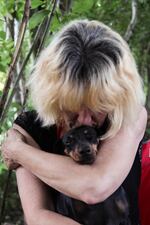
Carrie finds comfort in her dog Kona, as well as her five children in town who bring water for the couple.
Amelia Templeton / OPB
"I’m an alcoholic, and I struggle with it," Carrie adds. "I had three years sober. I would have had six, but I relapsed.”
Addiction is part of how you end up homeless. It’s also, Carrie says, how you cope with being homeless. Being made fun of or mistaken for a prostitute. Stealing food, being estranged from your family, getting beaten or raped.
“Between addictions and abuse — physical abuse, mental abuse, emotional abuse — sometimes it gets in one big ball of dysfunctional crap,” Carrie says.
Carrie and Zach and the other campers here know that in less than two weeks, police will sweep the trail and their campsite.
"I figured it would come sooner or later," Zach says.
Carrie is interested in a new homeless shelter opening in East Portland. Zach hates shelters and doesn't want to go to one. He has family in Hawaii but getting there seems like a long shot. So their future, even just two weeks from now, feels uncertain.
It’s getting dark. Luna and I walk back to my warm, safe, quiet house. Later, when I listen back to my tape, to put this story together, I cry a little. I want to bring them a bag of avocados. Get them into treatment. Find Zach a washboard.
I want to help. But I’m a reporter, and that’s not my job.
Read the first part of Amelia Templeton's two-part series on what it's like to have a homeless camp move into the neighborhood.

